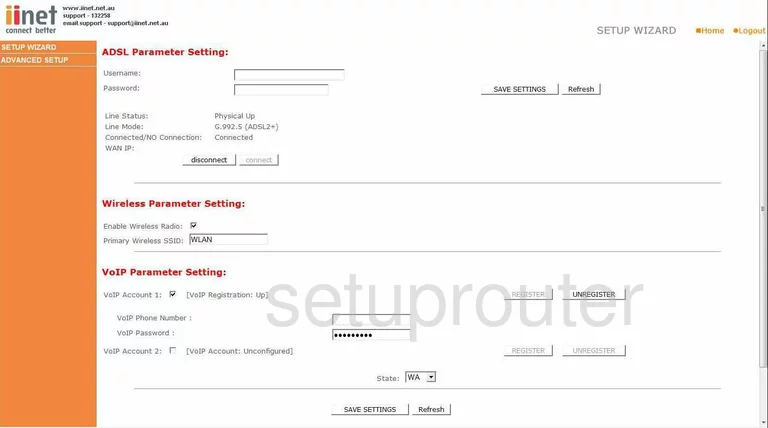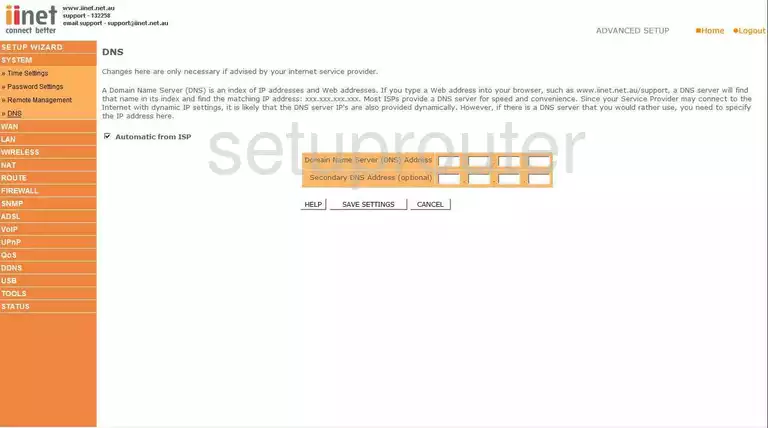This page shows how to change the DNS settings on the Belkin F1PI243EGau router.
Other Belkin F1PI243EGau Guides
This is the dns guide for the Belkin F1PI243EGau. We also have the following guides for the same router:
- Belkin F1PI243EGau - How to change the IP Address on a Belkin F1PI243EGau router
- Belkin F1PI243EGau - Belkin F1PI243EGau Login Instructions
- Belkin F1PI243EGau - Belkin F1PI243EGau User Manual
- Belkin F1PI243EGau - Belkin F1PI243EGau Port Forwarding Instructions
- Belkin F1PI243EGau - Setup WiFi on the Belkin F1PI243EGau
- Belkin F1PI243EGau - How to Reset the Belkin F1PI243EGau
- Belkin F1PI243EGau - Information About the Belkin F1PI243EGau Router
- Belkin F1PI243EGau - Belkin F1PI243EGau Screenshots
What is the DNS setting on a Router
When you connect a router to the Internet it gets a few settings from your ISP automatically. One of the settings that the ISP sets in your router is the DNS setting. DNS stands for Domain Name System and it is used to convert Internet names into actual IP addresses. For instance, when you go to "google.com", your are really connecting to an IP address that is mapped through DNS to a number such as:
- 173.194.33.73
This mapping happens automatically every time you visit any page on the Internet.
Why Change Your Router's DNS Setting
Some ISPs choose to abuse the DNS system and map unknown names to servers that they control. This can be done in a way that you don't know it is happening since your router is getting its DNS settings from your ISP. For instance, if you have one of these ISPs who is hijacking your DNS, and you try to surf the web to "some-random-site.com" and "some-random-site.com" does not exist, you might get a page back from your ISP with local advertisements on it.
By changing your DNS setting in your router you will effectively change the DNS setting for every computer on your network. This is because when a device is connected to your network your router automatically hands out its own DNS settings to that device. This way you can protect your entire network from ISP hijacking with just one setting.
What Should I Change My DNS To
There are 2 really great DNS servers on the Internet that you can choose from right now: Google Public DNS and OpenDNS. If you are not sure which one to pick then just use Google Public DNS.
When you change the DNS settings in your router, you usually have to enter a Primary and a Secondary setting. The secondary is only used if the primary can not be located. Here are common settings:
If you want to use Google Public DNS, use the following settings:
- Primary: 8.8.8.8
- Secondary: 8.8.4.4
If you want to use OpenDNS, use the following settings:
- 208.67.222.222
- 208.67.220.220
Login To The Belkin F1PI243EGau
To get started configuring the Belkin F1PI243EGau DNS page you need to login to your router. If you are already logged in you can skip this step.
To login to the Belkin F1PI243EGau, follow our Belkin F1PI243EGau Login Guide.
Change the DNS settings on a Belkin F1PI243EGau
If you followed our login guide above then you should see this screen.

When you log in to the Belkin F1PI243EGau you begin on the Home page. First, click Advanced Setup. From there click the System link on the left side of the page, then DNS.
Configure the DNS section of your Belkin F1PI243EGau

On this new page, leave the box blank that reads Automatic from ISP, it is located in the upper left corner of the screen.
Next you should see four boxes in a row labeled Domain Name Server (DNS) Address. Type in the primary IP address of the DNS Server you have chosen.
The next four boxes are labeled Secondary DNS Address (optional). You should enter the secondary address of that same DNS server here.
That is all there is to it, click the SAVE SETTINGS button and you're done.
Possible Problems when Changing your DNS settings
Most devices on your network will not begin using the new DNS settings until they have been rebooted. After rebooting a device you can go to it's network settings and verify that it is using the DNS servers that you specified.
Other Belkin F1PI243EGau Info
Don't forget about our other Belkin F1PI243EGau info that you might be interested in.
This is the dns guide for the Belkin F1PI243EGau. We also have the following guides for the same router:
- Belkin F1PI243EGau - How to change the IP Address on a Belkin F1PI243EGau router
- Belkin F1PI243EGau - Belkin F1PI243EGau Login Instructions
- Belkin F1PI243EGau - Belkin F1PI243EGau User Manual
- Belkin F1PI243EGau - Belkin F1PI243EGau Port Forwarding Instructions
- Belkin F1PI243EGau - Setup WiFi on the Belkin F1PI243EGau
- Belkin F1PI243EGau - How to Reset the Belkin F1PI243EGau
- Belkin F1PI243EGau - Information About the Belkin F1PI243EGau Router
- Belkin F1PI243EGau - Belkin F1PI243EGau Screenshots